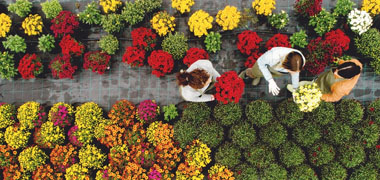
How do I become a farmhand?
Certificate II in Agriculture
- There are no mandated entry requirements.








Certificate III in Production Horticulture
- There are no mandated entry requirements.


Certificate II in Rural Operations
- There are no mandated entry requirements.








Certificate III in Rural Operations
- There are no mandated entry requirements.







Certificate III in Agriculture
- There are no mandated entry requirements.








Certificate III in Dairy Production
- There are no mandated entry requirements.



Certificate I in Agriculture
- There are no mandated entry requirements.



Operate Two Wheel Motorbikes
- There are no mandated entry requirements.
 Tocal College
Tocal College
Related occupations
Station Hand
A Station Hand performs daily tasks on agricultural properties, which may include mustering livestock, fixing fences, and operating machinery.
Piggery Attendant
A Piggery Attendant manages daily operations by caring for pigs, maintaining their environment, and assisting with breeding and transport.
Bore Runner
A Bore Runner ensures water points on cattle stations function properly, performing maintenance and monitoring water supply for livestock.
Organic Farmer
Organic Farmers grow crops and raise livestock without chemicals, managing daily tasks like planting, harvesting, and equipment maintenance.
Farm Manager
A Farm Manager oversees farm operations, making strategic decisions, managing staff, ensuring compliance, and handling administration tasks.
Station Manager
Station Managers oversee cattle stations, ensuring productivity, profitability, and compliance with regulations while managing a team and performing various tasks.
Dairy Farm Manager
A Dairy Farm Manager oversees cattle health, pasture preparation, milking, equipment maintenance, and milk sales, requiring animal handling and management skills.
Agribusiness Manager
An Agribusiness Manager oversees operations of a farm or agricultural business, focusing on marketing, accounting, and profitability strategies.
Poultry Farm Worker
A Poultry Farm Worker performs daily tasks on a poultry farm, including feeding, monitoring health, collecting eggs, and maintaining cleanliness.
Livestock Transporter
A Livestock Transporter moves animals between locations, ensures animal welfare, drives heavy vehicles, and handles loading and unloading tasks.
Sheep Shearer
A Sheep Shearer removes wool using shearing equipment, handling animals while ensuring their health and working long hours in a physically demanding role.
Sheep Shearing Trainer
A Sheep Shearing Trainer supervises shearers, training them in skills, animal handling, and equipment use while ensuring industry standards are met.
Wool Worker
A Wool Worker ensures smooth operations in a shearing shed, preparing sheep for shearing, assisting with wool classing, and maintaining equipment.
Wool Classer
A Wool Classer appraises and sorts wool based on quality for market sale, requiring attention to detail, physical fitness, and teamwork.
Stock and Station Agent
A Stock and Station Agent sells agricultural products and properties, appraising items, sourcing buyers, and facilitating sales processes.
Pen Rider
A Pen Rider moves cattle, monitors health, assists with transport, and maintains safety, using strong animal handling and teamwork skills.
Common questions
How much does a Farmhand earn?
In Australia, a full time Farmhand generally earns $1,346 per week ($69,992 annual salary) before tax. This is a median figure for full-time employees and should be considered a guide only. As you gain more experience you can expect a potentially higher salary than people who are new to the industry.
What are the job opportunities for a Farmhand?
There are currently 108,500 people employed as farm workers in Australia and this number is expected to rise slightly in the next five years. Work can be found across all states of Australia, but mostly in rural or regional areas.
Source: The Labour Market Information Portal – 2019 Occupation Projections
How do I become a Farmhand?
If you’re thinking of becoming a Farmhand, a Certificate II or III in Rural Operations is a good place to start. You could also consider the Certificate II or III in Agriculture. You’ll learn all the skills you need to work safely in a range of farming sectors.
Further reading


Choosing a security licence course in Australia: A step-by-step guide for jobseekers
10th November 2023)

